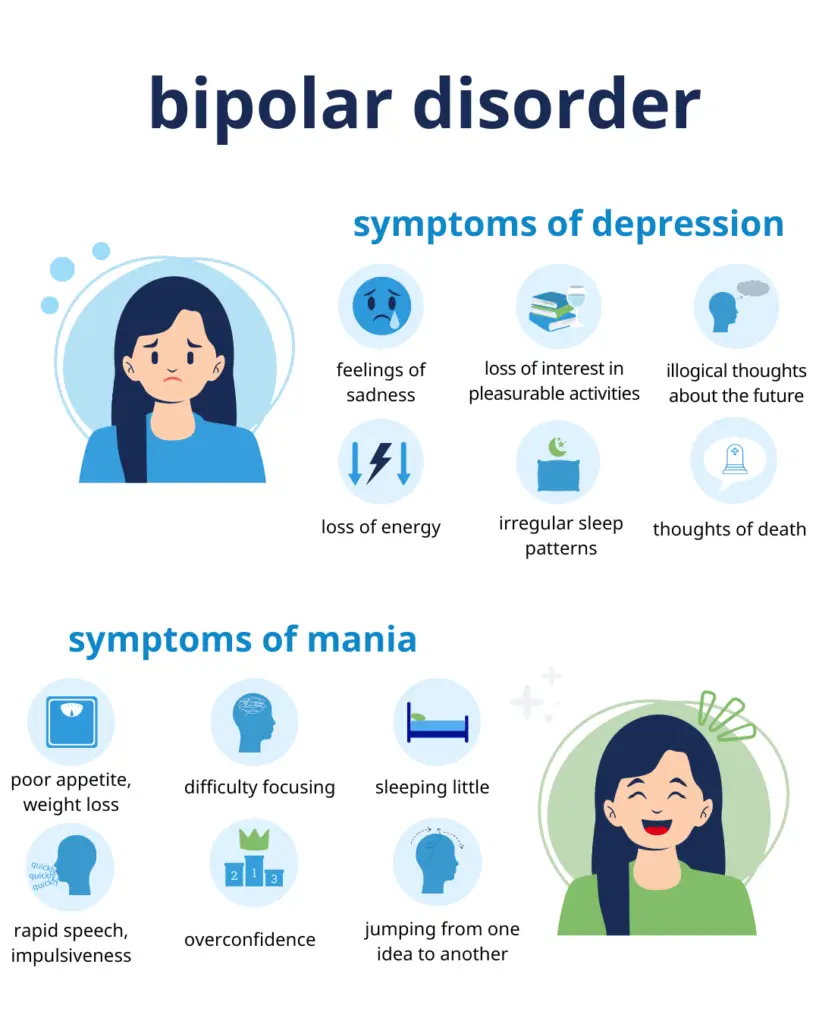Are you married to or living with someone who has bipolar disorder? If so, then you may have noticed certain patterns in the way your partner behaves. It can be difficult to overcome the highs and lows of bipolar disorder, but with patience and understanding, you can build a strong relationship together.
Our goal with this article is to help you better understand bipolar disorder relationship patterns so that you can overcome the challenges that come up in your relationship. By knowing what to expect, you can be prepared to deal with certain issues that may arise.
Let’s start with understanding exactly what bipolar disorder is.
What is bipolar disorder?
Bipolar disorder is a mental condition characterized by extreme mood swings between periods of elevated energy and activity (known as mania) and periods of depression. These mood changes can significantly impact daily functioning and relationships. People living with bipolar disorder often experience symptoms during the manic stage that are similar to those experienced while drinking alcohol or substance abuse without the use of substances.
There are three common types of bipolar disorder: bipolar I, bipolar II, and cyclothymia. Each type has its own set of symptoms.
- Bipolar I is the most severe type of bipolar disorder and is characterized by periods of mania that last for at least seven days or require hospitalization.
- Bipolar II involves depressive episodes and hypomanic episodes, which are less severe than manic episodes yet still noticeable and impactful.
- Cyclothymia is a milder form of bipolar disorder, characterized by fluctuating periods of hypomania and mild depression that do not meet the criteria for full-blown manic or depressive episodes.
Even though bipolar disorder is a lifelong condition, with the right treatment, it can be managed effectively. Coping with bipolar disorder relationship patterns requires strong communication skills, patience, understanding, and a good support network from family members and friends.
So, now that you know what bipolar disorder is, here are five tips for coping with bipolar disorder relationship patterns.
Tip 1: Learn about bipolar disorder
When it comes to bipolar disorder and relationships it’s important to learn as much as you can about the condition. This will help you better understand what your partner is going through and the symptoms they may experience. It will also help you identify when your partner needs help.
There are a few different ways that you can learn about bipolar disorder. You can read books, articles, or blogs like this one to gain a general understanding of the condition. If you’re looking for some specific book recommendations, Melissa Boudin, PsyD has a helpful article that lists the 17 best books about bipolar disorder.
Alternatively, you could watch documentaries or talk to people who have bipolar disorder to get a more personal perspective on their experience. One thing to keep in mind is that everyone experiences bipolar disorder differently. What works for one person may not work for another. Be sure to tailor your support based on what your loved one needs most.
Consulting with mental health professionals at Makin Wellness and accessing reliable resources can deepen your understanding of both the disorder and available treatments.

Tip 2: Communicate openly and honestly
When someone has bipolar disorder, their moods can change rapidly and without warning. They may not be able to control their behavior during a manic or depressive episode. Effective communication is crucial. When moods shift, express your feelings openly and honestly, even if you disagree with your partner’s behavior during an episode. Active listening and empathy are key.
It’s important to feel confident communicating openly and honestly about how you’re feeling, even if you don’t agree with the things your partner says or does during an episode. This will help your partner understand what you’re going through and how they can best support you in return.
Communication is key in any relationship, and it’s especially important when struggling with bipolar disorder. One way you can communicate with your partner is to share in their struggles and ask how you can help. You don’t want them to feel like they are burdening you, and it’s important they know that when bipolar symptoms hit, they have someone who cares about them in their corner.
Letting each other know how much you care goes a long way toward building trust in your relationship. Asking questions like “How did today go? What felt hard about today? How can I support you better tomorrow?” These types of questions open up a space to let your partner know that you’re present with them when things feel difficult and it gives them a safe place to be vulnerable with you.
Tip 3: Establish boundaries
During a manic or depressive episode, your partner may not be able to think clearly or make sound decisions. It’s important to set boundaries during these times and let them know what you are and what you are not comfortable with. This includes things like spending money, going out, gambling, or drinking.
It’s also important to set boundaries about what you will and will not talk about during an episode. Some things may be too painful or difficult for your partner to talk about when they’re not in a good place. Respect these boundaries and don’t push your partner to talk about things they’re not ready to.
It’s also important to remember that just because your partner is experiencing symptoms of bipolar disorder it doesn’t mean they’re being intentionally hurtful or manipulative. The best thing you can do during these times is to practice patience and understanding, but also let them know what behaviors are not okay with you.
A good way of setting boundaries with bipolar disorder is to make a list. List all the symptoms you can think of and put them in order from least distressing to most distressing. This will help your partner understand what they might need to do for you during those times and what other people close to you, like friends or family members, should be aware of as well. It’s also important to talk about how both of you feel when symptoms occur because there may be things that trigger these symptoms.

Tip 4: Reduce stress in your life
Stress can often aggravate the symptoms of bipolar disorder, so it’s important to find ways to reduce stress in your relationship. One way to accomplish this would be to incorporate an exercise routine together. This can help to release endorphins, which have mood-boosting effects.
You could also try relaxation techniques such as deep breathing exercises, yoga or meditation. Engaging in these types of activities together will not only help to reduce stress but create opportunities for quality time and connection.
Another great way to reduce stress is by setting realistic goals for your relationship. Don’t try to do everything at once – break down big goals into smaller steps that you can currently manage together.
Remember to go to your support network of family and friends who can offer practical and emotional support when needed. You and your partner can lean on them when you are having a tough time.
Tip 5: Seek professional help
If you’re feeling overwhelmed or like you can’t cope with bipolar disorder relationship patterns, it’s important to seek professional help. Bipolar disorder is a complex mental condition that can be difficult to understand and manage on your own. Seeking professional help means you can have access to resources, like medication and online therapy, that can greatly improve your quality of life.
Makin Wellness therapists and counselors can provide strategies for managing symptoms and improving relationship dynamics. Consider therapies like cognitive-behavioral therapy (CBT) or family therapy, which can be particularly beneficial. Professional support demonstrates a commitment to understanding and managing the condition effectively.
There are many different types of professionals who can help you with bipolar disorder and relationships, so it’s important to find one that is a good fit for you and your partner. This may take some time, but it’s worth the effort. A therapist can help you understand what triggers your partner’s bipolar disorder, how to best cope with the symptoms, and give you strategies for overcoming the symptoms. They can also provide emotional support during difficult times.
Seeking professional help is also important because it shows your partner that you’re serious about understanding them and willing to do whatever it takes to make your relationship work.
Need help with bipolar disorder relationship patterns?
Even though bipolar is a lifelong condition—following these tips can help you build a strong relationship that withstands some of the challenges you face.
Getting connected with someone that can help you manage the symptoms can be beneficial! If you’re dealing with bipolar disorder relationship patterns on your own and need help reach out to Makin Wellness today. Contact us at (412) 532-1249 or schedule an appointment at www.makinwellness.com.








